Displacement is becoming the new human condition. Walking to a new unknown fate is the seeming story that will never stop repeating – an age-old story, but one that we can’t seem to learn from.
Over 108 million people living among us today have been forcibly displaced (likely that number needs to be updated by about 1 million just in the past two weeks with Israel forcing those in much of Gaza out), and that doesn’t count those who have been displaced without officially being counted as forcible refugees, those left homeless by disasters, by the insistence that increased profit/wealth is a viable reason to push people from their homes, and the kinds of conflict that don’t register with the official UN counts.
Years ago, an ex of mine worked in a refugee camp in Kenya that was built in the early 1990s and intended to last a short time and to temporarily house 20,000-40,000 people. Today it is a complex holding well over 200,000 people. Children have been born there, lived, and died, never having left those camps, an entire life in a liminal no-state. From what I remember her telling me, the life expectancy of men in the camps was somewhere in the mid-30s.
I was with a friend tonight, celebrating her birthday, and she brought up the question of what it means to live life and celebrate as horrors unfold.
Of course, what is happening right now in Palestine isn’t the only horror unfolding at present. There was the forced exodus from Nagorno-Karabakh (part of a long history of expulsion and genocide of Armenians) that began just a few weeks ago, the attempt by Russia to takeover Ukraine continues with them launching a nuclear strike drill just today, Russians seeking to avoid conscription into an unjust war that will also kill them are fleeing their own country, war continues in Sudan, migrant crossings into the U.S. continue from countries ravaged by the policies and actions of the U.S., and in my own city the mayor is pushing to expel recent migrants and asylum seekers from temporary shelters.
It feels relentless and overwhelming, even when I have had many experiences lately that I am so grateful for, moments of real joy. It is hard to resolve the dissonance. It’s probably best not to try to resolve it, I guess.
I pulled this book out from my bookshelf after getting home tonight. I probably bought it right around when the paperback came out, some time in 2008. I wanted to return to it, see if I could glean any wisdom from it. A few days ago, I had just gone for a hike under very different circumstances than those he writes about here. Walking is such an amazing way to connect, to connect to the self, to connect histories – geologic, human, non-human, political, cultural. It’s all there. It’s the oldest form of transit we humans have, our bodies the original infrastructure.
This summer I had the chance to walk a great deal in the homelands of many different Pueblo people and their ancestors (now New Mexico), learning historíes of the earth and culture and colonization that I didn’t get taught in school. More connections made. The map of knowing expands.
Last year, while attending a conference on racial justice in Phoenix, I spent a night drinking wine and comparing notes with a writer who I had met only briefly another time – one of those nights where you sense you may never spend much time with that person again so you say what’s really going on. She mentioned that she regularly hikes for hours into areas of the Arizona desert to leave water and aid for migrants attempting that often deadly stretch of walking.
Walking, walking.
I haven’t had to use it for survival yet. But it definitely helps me cope. And I’ll be walking again, in protest, tomorrow.
Tonight I’ll keep looking for wisdom in other people’s footsteps.
